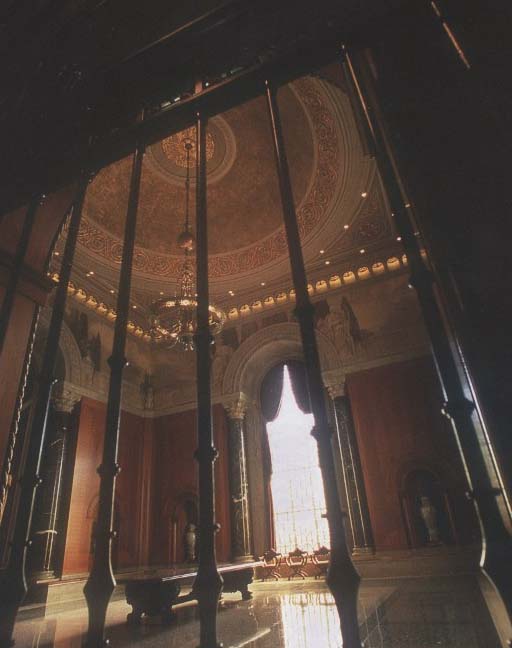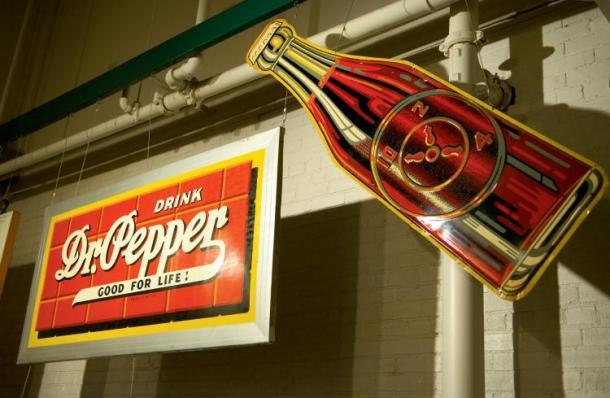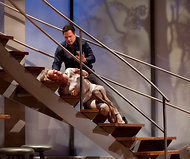“‘I know myself,’ he cried, ‘but that is all.'”
F. Scott Fitzgerald, This Side of Paradise
Archives for March 2012
TT: A pair of shrines
I recently spent a few days in Waco, Texas, the home of Baylor University, where I gave a lecture on Louis Armstrong, taught a class on Waiting for Godot, and spoke to two groups of exceedingly bright and delightfully polite students about various culture-related subjects. I also made two side trips, one to Baylor’s Armstrong Browning Library and one to the Dr Pepper Museum in downtown Waco.
 At first glance these two institutions would seem to have next to nothing in common. The Armstrong Browning Library, which first opened its bronze doors in 1951, is an imposing faux-Renaissance edifice that houses the world’s largest collection of materials by, about, related to, previously owned by, or removed from the bodies of Robert and Elizabeth Barrett Browning. In addition, the building’s sixty-two stained-glass windows, which incorporate and illustrate quotations from the Brownings’ writings, comprise the world’s largest array of secular stained glass. Most of the library’s contents were personally collected by Dr. A.J. Armstrong, a Baylor professor who loved Robert Browning’s poetry and who, in addition to donating his vast collection of Browningiana to the university, spent the latter part of his life raising most of the money that paid for the building in which it is now housed.
At first glance these two institutions would seem to have next to nothing in common. The Armstrong Browning Library, which first opened its bronze doors in 1951, is an imposing faux-Renaissance edifice that houses the world’s largest collection of materials by, about, related to, previously owned by, or removed from the bodies of Robert and Elizabeth Barrett Browning. In addition, the building’s sixty-two stained-glass windows, which incorporate and illustrate quotations from the Brownings’ writings, comprise the world’s largest array of secular stained glass. Most of the library’s contents were personally collected by Dr. A.J. Armstrong, a Baylor professor who loved Robert Browning’s poetry and who, in addition to donating his vast collection of Browningiana to the university, spent the latter part of his life raising most of the money that paid for the building in which it is now housed.
You will find on the library’s Web page this description of the building. It is in no way exaggerated:
This grand space is decorated with magnificent stained glass windows, soaring marble columns, black walnut marquetry paneling, intricate ceiling designs reminiscent of the Italian Renaissance, and an impressive brass-inlaid terrazzo entrance floor bearing a bells and pomegranates motif which is reflected throughout the building. The McLean Foyer of Meditation was the heart of Armstrong’s great design. It was to be a retreat of “such compelling beauty” that “if we by that means give the world another Dante, another Shakespeare, another Browning, we shall count the cost a bargain.” Its interior astonishes all visitors.
The Dr Pepper Museum, by contrast, is a far more modest affair, a three-story building in downtown Waco that originally housed the first Dr Pepper bottling plant and now contains a variety of exhibits recounting the history of the popular beverage, whose makers claim that it is “the World’s Oldest Major Soft Drink” and which was invented in 1885 by Charles Alderton, a Waco pharmacist. It is a charmingly homey little place on whose first floor can be found an old-fashioned soda fountain.
Of the two institutions, the Armstrong Browning Library is beyond question more historically significant. I dare say, though, that the citizens of Waco are no less proud that the World’s Oldest Major Soft Drink was invented in their home town, and I have no doubt whatsoever that more Americans know what Dr Pepper is than who Robert Browning was. Even among eggheads, Browning’s stock isn’t what it was when I was young, and while there is nothing remotely funny about the library, than which there is surely no more earnest place in all of Texas, I confess to having smiled to myself when my guide showed me a stained-glass window in which was embedded a quotation from A Grammarian’s Funeral.
All the same, it strikes me that these two buildings, dissimilar though they are, have something in common, which is that they are the embodiment of obsessions that were both innocent and fruitful. Even if you don’t care for Browning’s poetry, I expect that you would find it touching to visit a building whose very existence is an homage not merely to a once-famous writer but also to the obscure professor who loved his poems so much that he miraculously contrived to erect a building whose purpose (as he said when the cornerstone was laid in 1950) was to “radiate a spirituality that shall reach the ends of the world.”
 Needless to say, nobody had anything like that in mind when the Dr Pepper Museum opened its doors in 1991. Even so, it is, like the library, a monument to the iron determination of an individual. So far as I could tell in the course of my two-day visit, everyone in Waco knows that Dr Pepper was invented there, and no one to whom I spoke seemed anything less than delighted by the fact, as well they should be. While Charles Alderton’s fizzy concoction may not be quite comparable in importance to that of, say, the telephone, it is still an achievement of note, one that has given considerable pleasure to millions of people. I can’t imagine how many gallons of the stuff I’ve drunk since I was a boy, and I expect to drink many more between now and my latter end.
Needless to say, nobody had anything like that in mind when the Dr Pepper Museum opened its doors in 1991. Even so, it is, like the library, a monument to the iron determination of an individual. So far as I could tell in the course of my two-day visit, everyone in Waco knows that Dr Pepper was invented there, and no one to whom I spoke seemed anything less than delighted by the fact, as well they should be. While Charles Alderton’s fizzy concoction may not be quite comparable in importance to that of, say, the telephone, it is still an achievement of note, one that has given considerable pleasure to millions of people. I can’t imagine how many gallons of the stuff I’ve drunk since I was a boy, and I expect to drink many more between now and my latter end.
As well as being the home of Baylor University, Waco is, among other things, the birthplace of such worthies as Terrence Malick, Steve Martin, and Robert Wilson. Yet even the most assiduous of the city’s boosters freely admit that it is somewhat off the beaten path of réclame. All the more reason, then, to celebrate these two secular shrines, which remind us that in America, anyone who wants to do, make, find, or buy something passionately enough has a pretty fair chance of finding a way to get what he wants, no matter who he is or where he lives.
TT: Almanac
“‘Life is trouble,’ Zorba continued. ‘Death, no. To live–do you know what that means? To undo your belt and look for trouble!'”
Nikos Kazantzakis, Zorba the Greek (trans. Carl Wildman)
TT: Some highlights from Satchmo at the Waldorf
Yes, I’m thrilled that Shakespeare & Company will be producing Satchmo at the Waldorf this August in Lenox, Massachusetts–but that doesn’t diminish the delight with which I remember the world premiere in Orlando, Florida, last September. It was one of the great nights of my life.
Now Dennis Neal, who played the dual role of Louis Armstrong and Joe Glaser in Orlando, and Rus Blackwell, who directed the show, have put together a three-minute promo reel of highlights from their production of Satchmo at the Waldorf, which they hope to perform elsewhere in the future. I hope you enjoy it half as much as I did.
Warning: the language in this video is not suitable for children!
Take it away, Satch:
TT: Just because
Harpo Marx plays “Guardian Angels” in the 1945 film The All-Star Bond Rally:
(This is the latest in a series of arts-related videos that appear in this space each Monday and Wednesday.)
TT: Almanac
“It is stupid of modern civilization to have given up believing in the devil, when he is the only explanation of it.”
Ronald Knox, Let Dons Delight
TT: Everybody was wrong
In today’s Wall Street Journal I review two off-Broadway openings, The Lady from Dubuque and Tribes. Here’s an excerpt.
* * *
The premiere of Edward Albee’s “The Lady from Dubuque” was one of those soul-shriveling disasters that can blight a whole career. It opened on Broadway in 1980 to a raucous chorus of critical raspberries (John Simon dismissed it as “one of the worst plays about anything, ever”) and closed after just 12 performances. A decade went by before the author of “Who’s Afraid of Virginia Woolf?” recaptured his professional equilibrium, and even though Mr. Albee has long since gone on to further triumphs, “The Lady from Dubuque” vanished into the memory hole, going unrevived in New York until Signature Theatre surprised everybody by exhuming it this season. And guess what? It turns out to be a good play–very good.
 The subject of “The Lady of Dubuque” is death, which is personified by Elizabeth and Oscar (Jane Alexander and Peter Francis James), an urbane, well-dressed couple who pay an unwelcome visit to the suburban home of Jo (Laila Robins), who is suffering from an unspecified ailment that is killing her slowly and painfully, much to the dismay of Sam (Michael Hayden), her loving husband. Jo’s suffering has sharpened her tongue and corroded her inhibitions about using it on her friends and neighbors, four of whom have dropped by for drinks as the play gets underway. What follows bears a family resemblance to the “Get the Guests” scene of “Virginia Woolf,” with Jo hacking away in all directions until the pain reduces her to inarticulate howling. Then Elizabeth and Oscar make their unexpected entrance just before intermission, and what started out as a hard-edged naturalistic drama becomes a sky-high comedy…
The subject of “The Lady of Dubuque” is death, which is personified by Elizabeth and Oscar (Jane Alexander and Peter Francis James), an urbane, well-dressed couple who pay an unwelcome visit to the suburban home of Jo (Laila Robins), who is suffering from an unspecified ailment that is killing her slowly and painfully, much to the dismay of Sam (Michael Hayden), her loving husband. Jo’s suffering has sharpened her tongue and corroded her inhibitions about using it on her friends and neighbors, four of whom have dropped by for drinks as the play gets underway. What follows bears a family resemblance to the “Get the Guests” scene of “Virginia Woolf,” with Jo hacking away in all directions until the pain reduces her to inarticulate howling. Then Elizabeth and Oscar make their unexpected entrance just before intermission, and what started out as a hard-edged naturalistic drama becomes a sky-high comedy…
Ms. Robins is beyond any conceivable doubt the star of this show, in which she gives a scaldingly true-to-death performance, the kind that Cynthia Nixon ought to be giving in “Wit.” David Esbjornson, the director, has served Mr. Albee exceptionally well, striking just the right balance between amusing archness and horrific realism…
Not much needs to be said about Nina Raine’s “Tribes” other than that you should go see it as soon as you can. A well-wrought drama about a self-consciously arty family of compulsive talkers whose youngest member (Russell Harvard) is deaf, “Tribes” is being performed Off Broadway in a theater-in-the-round staging by the nonpareil David Cromer that maximizes the play’s considerable strengths…
* * *
Read the whole thing here.
TT: Almanac
“If I were dying, my last words would be: Have faith and pursue the unknown end.”
Oliver Wendell Holmes, Jr. letter to Jingxiong Wu (Apr. 10, 1924)
